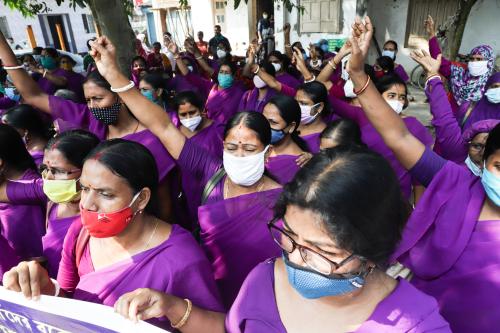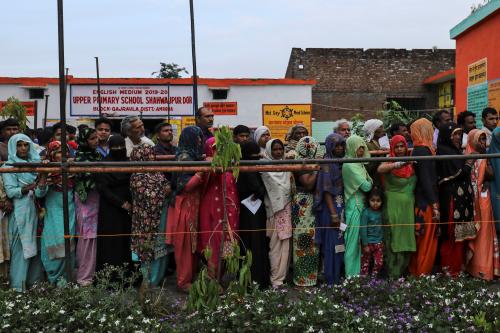As a result of the COVID-19 pandemic, countries, regions and cities have introduced a number of extraordinary measures such as quarantines and prohibitions of in-person gatherings “to help prevent the spread of the virus by speeding up decision-making and the allocation of resources.” Good governance, transparency, and accountability need to underpin all such measures taken by governments to mitigate the pandemic’s health and socioeconomic consequences. Civil society actors, such as advocacy groups, social movements, and watchdog organizations, are key to these processes—from holding governments accountable, to tracking whether at-risk populations have received vital support, to distributing key resources such as personal protection equipment when governments have been slow (or unable) to put measures in place.
This crucial role confronts the harsh reality that civic spaces have been shrinking around the world. Civil society is being squeezed by both the pandemic and other long-term trends, like political repression in illiberal regimes. Many civic and social accountability initiatives depend on local communities coming together and participating in meetings, demonstrations, and protests, yet all of these have come to a halt even in vibrant democracies following worldwide prohibitions of in-person gatherings. In addition, gaining public attention to promote civic initiatives and flag civic violations has become particularly difficult, as most media and public channels are focused on the pandemic. In some countries, such as the Philippines, Turkey, Hungary, and Bangladesh, leaders have purposefully been using pandemic-related restrictions to reduce civic spaces, muzzle critics, and centralize influence.
Shrinking civic spaces and curtailed civil society influence have severe consequences for effective governance. Oversight of governmental and corporate proceedings becomes weakened, paving the way for inadequate transparency and accountability, both of which are critical to bolstering conventional accountability processes, including “political checks and balances, accounting and auditing systems, administrative rules and legal procedures.” Legislatures have faced operational disruptions, with travel and meeting restrictions further limiting legislators’ access to their constituents’ viewpoints. A lack of civil society oversight puts the global pandemic response in jeopardy, spoils resources and supplies due to gaps in procurement supervision, and erodes trust in public institutions.
Fortunately, there are also some positive developments that should be replicated more broadly. At the same time that physical civic space has been contracting, its virtual equivalent has been expanding in some places. The COVID-19 pandemic has witnessed a boom in online activity and the desire to participate, with the creation of hundreds of social media accounts and crowdsourced mapping projects coordinating assistance and sharing information. Civil society organizations (CSOs) and some governments have been working to remain connected during the pandemic. Governments have been relying on virtual public forums where citizens can submit claims, ideas, and opinions. For example, over 50 organizations, regions, and cities in Europe have started using Decidim, an online open-source platform compliant with the General Data Protection Regulation (GDPR)—the European Union’s data protection law—in order to convene and deliberate about the state of affairs during the pandemic. Many legislatures have relied on technology like Zoom to allow representatives to meet virtually while inviting the public to participate.
CSOs have also used digital tools to hold governments and private companies accountable during the COVID-19 crisis. Ukrainian civil society has been using ProZorro—an open-data platform created in 2016 to closely monitor public spending and government procurement—to keep in check government procurement of essential COVID-19 resources, such as surgical masks. This process is essential to maintaining transparent prices and warding off “manipulation by procuring entities and speculation by suppliers.” The Mexican CSO Project on Organizing, Development, Education, and Research (PODER) has been using the hashtag #EmpresasConTache on social media to “identify companies who defy labor regulations to reduce salaries and benefits of workers, force them to request unpaid leave, or force them to work in high-risk working conditions with the threat of dismissal.” At least 14 companies have been flagged since the beginning of the pandemic. These are only a couple of instances of the many ways in which digital civic spaces have adapted to support transparency and accountability during the pandemic.
These developments hold promise for the post-pandemic future. The COVID-19 crisis can provide an opportunity to digitalize civic spaces much more extensively. Governments, corporations, and private individuals have started to recognize the necessity and opportunity to transform civic spaces, as digital acceleration—the creation of new online spaces and mechanisms, and the reinforcement of pre-existing ones—is essential to COVID-19 recovery oversight at a time when physical gathering is unsafe.
These virtual public forums and online legislative proceedings should be more widely utilized across all areas of government and continue to be used post-pandemic. Together with complementing invaluable in-person gatherings, virtual ones should be employed to reach even more constituents, and to explore the public’s expertise to reinforce law making. Public agencies and officials should ensure that they are easily reached through up-to-date social media accounts and working phone numbers. A number of citizen participation tools and open-data crowdsourced platforms exist, and should be bolstered. The Open Government Partnership recommends using virtual deliberation platforms such as “Consul, DemocraciaOS, and Bang the Table,” along with “online participatory budgeting like Balancing Act” that enable constituents to have a say in how governments spend public money. Surveys and virtual “office hours” should be used to form various spaces with which the public can engage. Hundreds of social media groups and crowdsourcing platforms were spontaneously created at the beginning of the COVID-19 crisis for immediate pandemic response, such as providing neighborhood assistance and monitoring the spread of the virus. Some of these crowdsourcing groups could be tapped to promote further transparency and accountability in the coming steps of the pandemic, like monitoring the vaccine distribution, and beyond.
We must build global capacity in bolstering existing platforms and creating new virtual mechanisms, but also in bridging the digital divide. Computer and internet access needs to increase, especially among groups that are currently confronted with “barriers to virtual participation, such as senior citizens, women, and rural communities.” It is also important to ensure that public officials have the know-how and tools necessary to engage in virtual public participation, such as maintaining a strong online presence and judiciously picking what platforms and open-source formats to rely on. Furthermore, civic spaces need to harness these virtual spaces and technology while ensuring that critical data is well-protected and secure.
It is true that convening, deliberating, and voting online can have the adverse effect of losing interpersonal marginal interactions that cannot happen over video conferencing calls. We are not proposing the elimination of in-person convenings, which remain vital. Yet, there is much to gain from adding digitalization of civic spaces to the mix. That allows us to reach a more diverse range of people who will ultimately provide our world with more informed participation. Any acquired information can be stored and displayed in open-source platforms, effectively building a transparent archive from which inputted information can be used later on. The work that can be achieved by digitalizing civic space is ultimately invaluable to improving governance by holding public officials and private companies to the highest standards. Accountability mechanisms like “participatory budgeting, public expenditure tracking, monitoring of public service delivery, investigative journalism, public commissions and citizen advisory boards” can be better wielded by CSOs through digitalized civic spaces by being accessible to a wider range of people, and supported by transparent open-source databases.
Let the terrible COVID-19 pandemic have the positive aftermath of reinforced civic spaces. Building and supplementing the infrastructure needed to bolster CSO reach and influence is key to overcoming the pandemic and the breaches in transparency, accountability, and anti-corruption that it has fostered. Transparency and accountability must remain at the center of all COVID-19 recovery efforts, including during the vaccine distribution process.
We must not let these efforts go to waste after the pandemic subsides. Instead, we should seize this opportunity to reinforce countries’ digital resilience and access to crucial public services during crises by building platforms that will reinforce future accountability, transparency, and oversight mechanisms.
The Brookings Institution is committed to quality, independence, and impact.
We are supported by a diverse array of funders. In line with our values and policies, each Brookings publication represents the sole views of its author(s).






Commentary
Digitizing civic spaces amid the COVID-19 pandemic and beyond
March 9, 2021